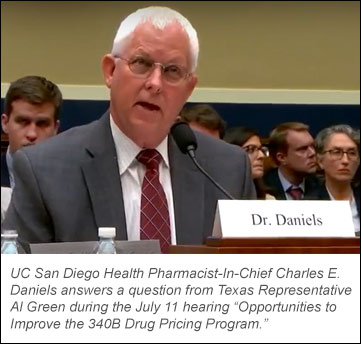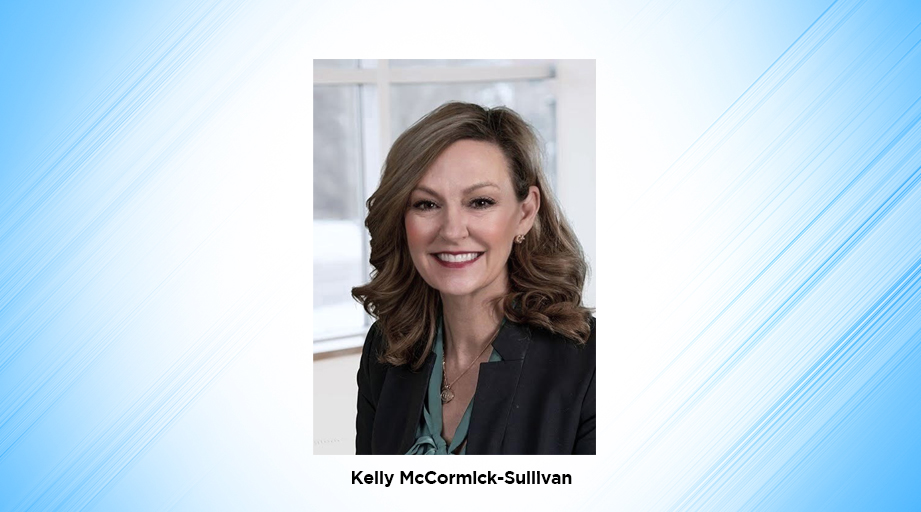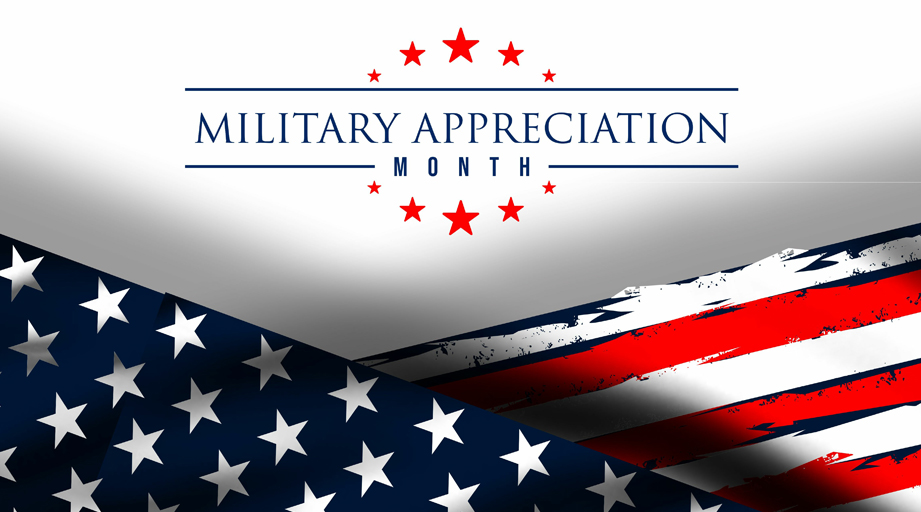
 Charles E. Daniels, pharmacist-in-chief for UC San Diego Health in California, recently delivered a strong message to members of the U.S. House of Representatives who are debating the future of the 340B Drug Pricing Program.
Charles E. Daniels, pharmacist-in-chief for UC San Diego Health in California, recently delivered a strong message to members of the U.S. House of Representatives who are debating the future of the 340B Drug Pricing Program.
“Any efforts in rulemaking or legislation to scale back the 340B Drug Pricing Program would be consequential to our patients and the patients of safety net providers across the country,” Daniels said during a July 11 hearing before the House Energy and Commerce Committee’s subcommittee on health.
“The 340B outpatient drug discount is the lifeblood of so many services that UC San Diego Health provides to underserved patients,” he said.
Daniels said UC San Diego Health uses revenues generated through the 340B program to fund an array of services, including free or discounted medications for patients, medication reconciliation services, and a “meds-to-beds” program to improve transitions of care. He said the revenues also support the delivery of comprehensive care for patients with HIV infection.
He said the 340B program has important flexibility that allows each covered entity to determine “how best to use the savings to serve the unique needs of its underserved patient populations.”
The House and Senate have held several hearings recently to showcase numerous bills that propose to change various aspects of the 340B program, which is administered by the Health Resources and Services Administration (HRSA).
Some of the bills would make fundamental changes to the program that could limit incentives for hospitals to participate. Other bills would make changes that are supported by hospitals and other 340B program advocates.
ASHP has stated its support for H.R. 2889, the Closing Loopholes for Orphan Drugs Act; and H.R. 4392, which would retroactively reverse a recently implemented cut in the amount that some 340B-participating hospitals receive as reimbursement for outpatient drug costs under the hospital outpatient prospective payment system (OPPS).
During his testimony, Daniels acknowledged the supportive work of California representatives Doris Matsui and Scott Peters. Peters represents San Diego.
Matsui is the sponsor of H.R. 6071, which would clarify the intent of the 340B program, codify patient eligibility, and prevent a narrowing of the definition of a patient, such as by the use of insurance status to determine eligibility. H.R. 6071 also contains language similar to that in H.R. 4392 that would reverse the cut in OPPS-related reimbursement for drugs and biologicals purchased through the 340B program.
Medicare this year lowered the amount it reimburses hospitals for outpatient drugs purchased through the 340B program to the average sales price (ASP) minus 22.5%, well below the previous rate of ASP plus 6%. Rural sole community hospitals, children’s hospitals, and some cancer hospitals are exempted from the cut this year.
Daniels, in response to questions from the committee, said the cut will have an estimated “$8 million negative impact” on UC San Diego Health this year.
The committee also discussed transparency within the 340B program. Some members voiced concern about the ability to determine whether drug manufacturers are overcharging hospitals and clinics for 340B-covered drugs.
Other members stated adamantly that hospitals must fully account for their use of 340B revenues, although there is no statutory requirement for covered entities to do so.
New Jersey Representative Frank Pallone asked for clarification on the extent to which hospitals are able to ascertain which patients receive benefits from 340B program revenues, particularly when patients pick up medications at the pharmacy.
Fred Cerise, president and chief executive officer of Parkland Health & Hospital System in Dallas, Texas, said that although every patient treated by the health system qualifies as a patient in the 340B program, the health system doesn’t immediately know its cost for individual 340B-covered drugs for specific patients.
“We can track that in aggregate,” Cerise said. “Oftentimes, we don’t know what reimbursement is at the time that we dispense.”
Daniels said information about drug costs isn’t associated with specific patients as the data flow to and from payers.
“The biggest challenge that I see is being able to separate the payment that comes back to the organization from the payers . . . at the patient-specific level,” Daniels said.
Daniels emphasized that his organization, which has participated in the 340B program since its inception, takes a systematic approach to complying with the program’s existing regulations.
He said UC San Diego Health conducts monthly audits of a subset of its hospitals, offsite outpatient facilities, and pharmacies, including contract pharmacies, and promptly corrects any problems that are found.
“We have no interest in putting the program, or ourselves, at risk,” Daniels said.
That risk includes punitive actions from HRSA that may be taken if a covered entity receives from a manufacturer both the 340B-discounted price and a Medicaid rebate for the same drug, known as a duplicate discount. HRSA may also assess penalties for diversion—providing 340B-purchased drugs to patients who are not eligible for the program—and for other problems found during agency audits.
Matsui questioned one of the hearing’s witnesses, Debra A. Draper, director of health care for the Government Accountability Office (GAO), about how HRSA directs its auditing efforts.
Draper said GAO has determined that HRSA audits “a few hundred” covered entities each year but has audited just 12 manufacturers since the inception of the 340B program. Congress enacted the 340B program in 1992.
Matsui’s bill, H.R. 6071, would ensure that more drug manufacturers and wholesalers are audited for compliance with the 340B program’s requirements. The bill also establishes monetary fines for manufacturers and wholesalers who overcharge hospitals and clinics for 340B-covered drugs.
[This news story appears in the August 15, 2018, issue of AJHP.]









